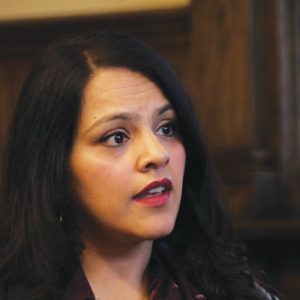Profile
Born: Calgary
Education: BA in economics and political science; MBA; U of C
Prior to politics: VP of business development for Fracture Modeling Inc.
First elected: 2019/4/16
Riding: Calgary-North East
Sworn in as Minister: 2019/4/30
Responsibilities: Income, employment, disability supports; family violence prevention; other community supports
Contact: css.minister@gov.ab.ca
Deputy Minister: shannon.marchand@gov.ab.ca
Interview
Interviewed by Evan Osenton
AV: Did you grow up in a politically engaged household?
Sawhney: I actually didn’t. My parents immigrated to Canada in the late 1960s, and our household was very much trying to make ends meet. My dad is well educated, so we watched the news every night and knew what was going on. But in terms of actual engagement, there was very little.
AV: So when did you personally get interested or involved in politics?
Sawhney: Through my extended family. My cousin is George Chahal; he’s the councillor for [Calgary’s] Ward 5 and I worked on his very first campaign. [I did] a lot of door knocking with him and his family in 2007, the first time he ran. He lost by 33 votes. I helped again in 2013 and 2017. His family is more politically engaged, and I was always on the outskirts of that. But when he decided to run for councillor, we were all in—the whole family. And I found it exciting. In the last campaign I was heavily involved and became very aware of the different issues in the neighbourhoods I grew up in.
AV: When did you get interested in provincial politics?
Sawhney: I have a background in energy; I’ve been in oil and gas for 23-plus years. I was working for the Alberta Energy Regulator on methane emissions abatement regulations. I was an economist on that file. And I just wasn’t happy with government policy. I saw, with my own eyes, investment fleeing the province. A lot of major oil and gas companies exited, and I became very concerned. I have a daughter who’s a reservoir engineer. You start thinking “What kind of opportunities are going to be available for graduates or even for somebody like me?” And that’s when I thought: I’ve been in this space for a long time. I have a very articulate voice. I need to advocate for the energy industry.
AV: Public trust in politicians is low, often ranking below scientists, corporations, NGOs, the media. How much trust do you place in politicians?
Sawhney: I personally have never felt distrust of politicians. It’s a difficult job. There are many factors at play. You can’t predict what will happen with commodity prices. Some things that happened in Alberta with respect to oil and gas, nobody can do anything about them. But the UCP did a lot of public engagement. I did a ton of doorknocking. Our platform commitments are very specific, and we’re going to deliver on them. Hopefully that’ll go a long way in restoring some of that lost trust.
AV: You wrote on your campaign website that “as a working mother of four… I understand the challenges women face balancing responsibilities at home and in the workplace.” Does the government have a responsibility to help women face these challenges?
Sawhney: All employers—government, private sector, non-profit—have a responsibility to be cognizant of the needs of not just women but all parents. We have an evolving society, with lots of things at play, and they should create policies to help parents manage things a bit better.
AV: What’s something government could do or make the private sector do differently—a law they could change?
Sawhney: Let me tell you about a conversation with the premier. After the election he asked me, “How do you feel about work/life balance? I didn’t know you have young children. To make things easier, you can work out of McDougall [Centre], because there’s a lot of travelling back and forth.” That conversation meant a lot. I’ve never had that conversation with an employer before, save one. So I think it set the tone in terms of a recognition that parents have a whole other life that’s equally, if not more, important.
AV: What about the gender pay gap? Should the government do anything to address this?
Sawhney: I don’t think so. Awareness is important, but I don’t think the government’s role is to enforce wage parity, because that’s very difficult. I think it’s a problem. Employers need to get on board. And I don’t know what the proper mechanisms are to install. But I don’t think it’s government regulations.
AV: Do our political institutions need to change to attract more women to run for office?
Sawhney: I think attitudes moreso need to change. The UCP did a tremendous job in engaging women and encouraging them and opening doors. Just making it easier for women to be involved. Any position has to be based on merit, but we also need to remove barriers that prevent women and other minorities from making their way through certain doors.
AV: What barriers to women entering politics do you want to remove?
Sawhney: I know this isn’t true in all cases, but I was so involved in my job and my family and raising my children. You just don’t know what you don’t know. I didn’t know about the social media aspects of campaigning, and I wasn’t as networked as maybe a lot of my male counterparts were. So systemic situational barriers exist, and sometimes you just need a bit more resources to catch up. Like, how to do fundraising, how to meet people who can help with your campaign.
AV: The UCP platform says “The get ’er done spirit of Albertans means we don’t sit around waiting for government to solve a social problem. One of the first principles of conservatism is that civil society should come before government and that voluntary groups are generally more effective in preventing and reducing social problems than a big bureaucratic state.” What problems do you think charities and volunteers are more effective at addressing and which are better handled by government?
Sawhney: It’s a bit of a difficult question because I’m just so new to the portfolio. If I’m just going from intuition, and based on my own volunteer experience, I’d say frontline support workers in women’s shelters and sexual assault centres know the issues, the clientele, know what they need. Also, persons with developmental disability organizations. Having first-hand knowledge of vulnerable segments of society [makes] organizations better equipped to design programs and ensure clients’ needs are met. Government has a very, very significant role in ensuring we provide funding to these kinds of organizations so that basic services are in place. [As for when] government is better suited, AISH is legislatively mandated. It’s government’s responsibility to ensure those people have basic income to meet their needs.
AV: The 2012 report “Poverty Costs” argued that investing in poverty prevention costs less than spending to alleviate the consequences of poverty. What do you think of that idea?
Sawhney: Poverty is such a complex, multifaceted issue. There are many different elements; people are born in poverty and that cycle perpetuates. But the real-life stories I encountered… people who want to work, are able to work, but are unable to find opportunities and are down to their last 10 bucks. All you want is to be able to pay your mortgage, your rent, put food on the table. So preventing and reducing poverty—you know, investing in programs that get people to work, removing barriers that prevent them from working, creating opportunities, particularly for the disabled community, the sooner we’ll move toward the goal of reducing poverty in our society.
AV: In February, StatsCan showed that Alberta’s child poverty rate was cut in half between 2015 and 2017, from 10 per cent to 5 per cent, which is the lowest rate in Canada and means 44,000 fewer children are living in poverty. What do you attribute that to?
Sawhney: I haven’t read the report. But I’m very pleased to [hear] those numbers. Obviously, we all want to go in the same direction and we all want to alleviate poverty. I’d have to look at the report and the assumptions and the statistics and how—I don’t even know how child poverty is really defined. Maybe we need to do more. But my immediate response is bravo. That’s wonderful.
AV: In January, Alberta increased AISH and income support and indexed those to inflation. What do you think of those moves?
Sawhney: I think it’s fair. It’s compassionate. I think it’s sensible. Inflation has made life much more expensive for all Albertans, all Canadians. I’m fully supportive.
AV: Some critics of income support say eligibility is too lax—that it’s too easy to go on welfare. Others say it’s so strict you have to be destitute before you qualify. What do you think?
Sawhney: I’m still learning the benchmarks for eligibility, so I won’t comment. But, again, government’s role is to make sure we take care of Albertans. And, like I was saying, if somebody has 10 bucks in their bank account and they don’t know where their next meal will come from…? We need to help out when we can. We’re a compassionate, giving society; we take care of each other; civil society has a big role to play and government has a role. We need to develop partnerships to ensure everybody has a life of dignity and has equality of opportunity.
____________________________________________




